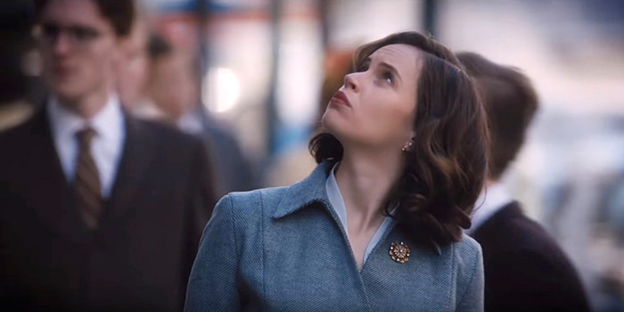The second of two Ruth Ginsberg films made in 2018—along with the documentary RBG—the grandiose and tenuously-connected-to-reality ON THE BASIS OF SEX is a film which wields its own interrogative brand of formalism against itself, trapping the characters in a weary spider web of mismanaged plot threads and assembly-line smiles and frowns (with a pair of menacing eyebrows to boot). There is nothing here that hasn’t been done better, executed with more finesse, directed with more flair, and written with more substance than a Buzzfeed puff-piece.
We first glimpse Ruth Ginsburg as she makes her way through a fleet of male grad students to hear the introductory speech by the Dean of Harvard Law School (a sultry and tranquilized Sam Waterston). From there we get a broader view of Felicity Jones’s performance; the casting decision always struck me as very odd. One would think that the permission to portray the venerated and highly popular Supreme Court justice would be granted to an actor whose Brooklyn accent capabilities extended beyond a mere non-rhotic inflection on literally only the word “lawyer.” What’s more, the film addresses Ginsburg’s Judaism but once, and even in that context, it’s the end of a punchline, in a scene where the louse interviewing Ginsburg stares at her breasts for a considerable amount of time. It’s probably the most effective moment of the film, for the sole reason that it doesn’t dilute sexism down to fiery, impassioned monologues by high-contrast evil-doers depicted in the BOURNE ULTIMATUM color palette (more on this later). It captures a moment of pure dehumanization, at the root of what the film attempts—and fails—to prove via its painfully platitudinous declarations of war against chauvinism.

The film is flaccid on all fronts, fumbling through an establishing romance scene in which one can practically hear director Mimi Leder shouting into her megaphone,“You’re in love, be in love!” This is almost immediately followed by a serious health scare (appearing not 20 minutes into the film). Maybe this is the way the medical quagmire played out in “real life,” but it’s a strange segment to include (so early into the film, too) in a product that’s all about bending and distorting the truth. The film ostensibly follows Ginsburg as she attempts to make an argument for misandry around a case that is, on the surface, about taxes. Scenes are rapidly whittled down to appealing soundbites and trailer lines, such as a moment when the unfortunately cast Kathy Bates asks our lawyer what she said her name was: “Ruth… Bader… Ginsburg,” she answers, with the dramatic flair and revelatory timing of a newly christened messiah.
Coming back to the sensationally-depicted cartoon misogynists—as noted before, they are showered in harsh lighting and, in one genuinely amazing sequence, we watch them as they unironically riff on every single manifestation of misogyny they can conjure to defeat Ginsburg. The turning point in Ginsburg’s decision to take the tax case is one of the most outlandish moments in 2018, when she witnesses her daughter respond fiercely toward a catcall. It is insulting in its simplicity, and manages to boil down the women’s liberation movement to mildly angry responses to blatant misogyny—while that was certainly a constant, there is much more about the plight of women seeking intellectual and academic roles, the more subtle and seemingly innocuous forms of sexism that would offer a paradoxically more comprehensive understanding of women’s liberation. There is mention of the younger generation taking to the streets in protest, but the film itself possesses none of that revolutionary spirit itself, slogging through its story beats the way only a 21st century biopic can.

It’s a bird… It’s a plane!… No, it’s Moritz v. Com – 55 TC 113 (1970)
The film engages in many an egregious sin—Ruth’s motivations and goals are offered directly and explicitly to us through a monologue Armie Hammer delivers to his daughter, a screenwriting tactic that spells instant cinematic death—and the film attempts to derive comedy from moments that are intended to be serious: a scene where a woman’s dementia is played for laughs comes to mind. Nearly every misogynist male in the film carries his own mini “arc,” where he starts off a chauvinist and, after being touched by Ruth and her diligence and considerable intelligence, becomes a “little less bad.” It’s a stunningly conservative move for a film that should be about the tenets of liberalism—redeeming your sexist male characters, even through an inauspicious close-up, is a morally bankrupt move and its only purpose in the film is to make male audiences feel more comfortable about their closet misogyny.
ON THE BASIS OF SEX is, above all, a tired film. There is nothing new or refreshing or exciting about the picture—it exists in a sordid intellectual vacuum, a vacuum filled with the corpses of similarly dull and uneventful biopics which portend to depict true events but end up falsifying the people they are so desperate to venerate. As noted above, the finale is the worst of shock tactics, relying on a simulation of tactility and tangibility to save the fatigued biographical exercise on the screen. There were more than a couple gasps in my theater—I’m going to assume those were gasps of elation, not necessarily exhaustion, though I hope my own gasp, composed of the dual dulcet tones of shock and incredulity, made it somewhere into the symphony to balance out the smorgasbord of inauthentic and woefully misplaced praise.















Comments